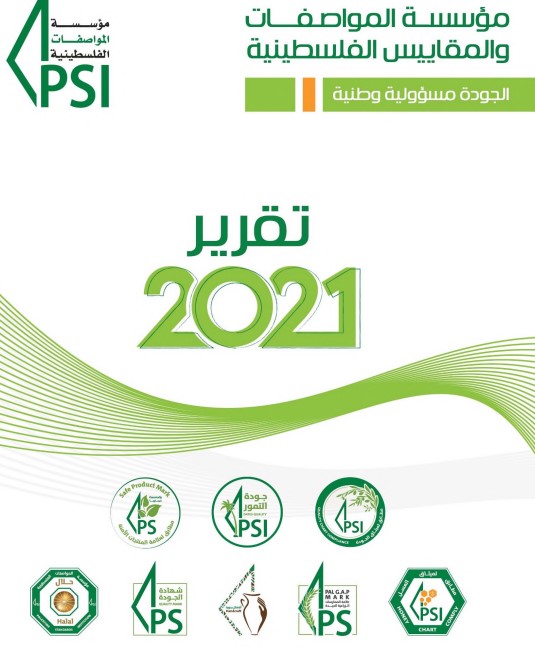Standards and Metrology Institution Issues Its Annual Report for

Palestinian Standards and Metrology Institution Issues Its Annual Report for 2021
The Palestinian Standards and Metrology Institution (PSMI) has released its annual report for the year 2021. The report serves as a mirror reflecting all the achievements of the institution, represented by the activities of its various departments, which have worked diligently throughout the year. Tasks are distributed in accordance with the nature of work, position, and capabilities of the institution’s staff, who strive to achieve the goals they have set to advance both their material and human capacities.
Eng. Haider Hajja, Director General of the Institution, explained that the PSMI was established in 1994 by a decree from the late President Yasser Arafat, may he rest in peace, and began operations at the end of 1996. The institution currently operates under the Standards and Metrology Law No. 6 of the year 2000. Legally, the institution is considered a public sector body serving the state, business community, and citizens, with policies and directions set by its Board of Directors.
Hajja emphasized the institution’s aim to promote comprehensive and sustainable development and to keep pace with contemporary changes and developments at national, regional, and international levels. It also seeks to provide the best services to beneficiaries while safeguarding consumer health and safety.
The report highlights key technical achievements across various activities and services offered by the institution. Despite challenges faced globally and locally in 2021 due to the COVID-19 pandemic, the institution successfully met its goals, achieving a 22% increase compared to 2020, with a projected 15% increase expected for 2022.
During the year, the institution launched the Palestinian Good Agricultural Practices system (Pal GAP), the first national quality system for Palestinian agricultural products. It was developed by a national team formed by the institution to consider Palestinian specificity and align with the Global GAP international standards.
Additionally, the institution introduced a Quality Charter for Palestinian Traditional Handicrafts, recognizing their role as an essential part of Palestinian heritage and identity. This charter serves as a tool to restore the central role of these crafts in the economic, social, and political life of the Palestinian people and to preserve their cultural heritage.
In 2021, the institution prepared and approved 165 new Palestinian standards and updated 104 existing standards, bringing the total to 269 standards. Several other standards are in preparation stages, aiming for future approval. The total number of approved Palestinian standards now stands at approximately 4,654.
Regarding mandatory technical regulations aimed at protecting consumers and providing technical references to regulatory bodies, the institution approved 11 new regulations in 2021, bringing the total number of issued mandatory technical regulations to 108. Twelve previous regulations were canceled and replaced by newer instructions.
In certification services, Hajja stated that the institution works to meet the needs of industrial and economic sectors and to improve their performance and product quality. In 2021, 78 new certificates were granted in areas including quality, supervision, halal certification, safe products, Palestinian Good Agricultural Practices, the Palestinian Honey Quality Charter, and the Quality Charter for Traditional Handicrafts. Additionally, 42 certificates were renewed in these areas, making the total certificates granted and renewed 381. The institution received 108 certification applications in the year. Consequently, the number of companies and factories monitored by the institution for quality marks, halal, safe products, agricultural practices, and quality charters reached 498 facilities. During 2021, two new certification marks were introduced.
The report also highlights inspection and conformity services, where 661 technical tests were conducted for certification and conformity of national products bearing the institution’s marks (“Quality” and “Supervision”) across various sectors. The institution processed 744 import-related cases, conducted 3,694 operational inspections for elevators and other operational systems, and approved 1,336 data sheets. It participated in 328 technical committees for government tenders and issued 480 conformity certificates. Moreover, specialized lab tests included 38 shoe lab tests, 45 cement lab tests, and 20 electrical lab tests.
In support of the national economy, the institution worked to increase consumer confidence in local products by implementing metrology roles aimed at improving the quality of domestic and imported products. Verification and calibration of measurement devices in various fields were conducted to meet local and international requirements and standards, positively impacting citizens’ lives and protecting their rights.
Achievements in verification and calibration included calibrating 1,275 devices in industrial calibration for factories and laboratories, verifying 5,371 devices in markets across fields such as gold scales, fuel pumps, and commercial scales, and inspecting 335 pre-packaged products.